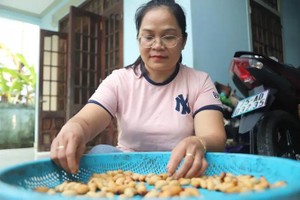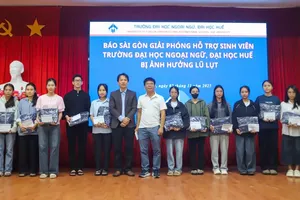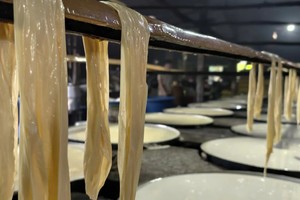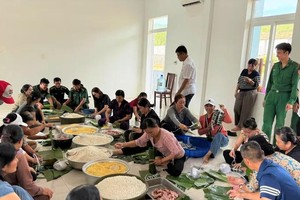Born as a regular person, Christine Ha's life took an unexpected turn when, at the age of 20, she was diagnosed with an autoimmune disease and gradually started losing her vision. However, with extraordinary determination, Christine Ha overcame this challenge and earned a Master of Fine Arts in Creative Writing at the University of Houston, where she served as the fiction editor for the Gulf Coast: A Journal of Literature and Fine Arts. She also holds a bachelor's degree in business administration and finance from the University of Texas and works as an editor for numerous American literary magazines.
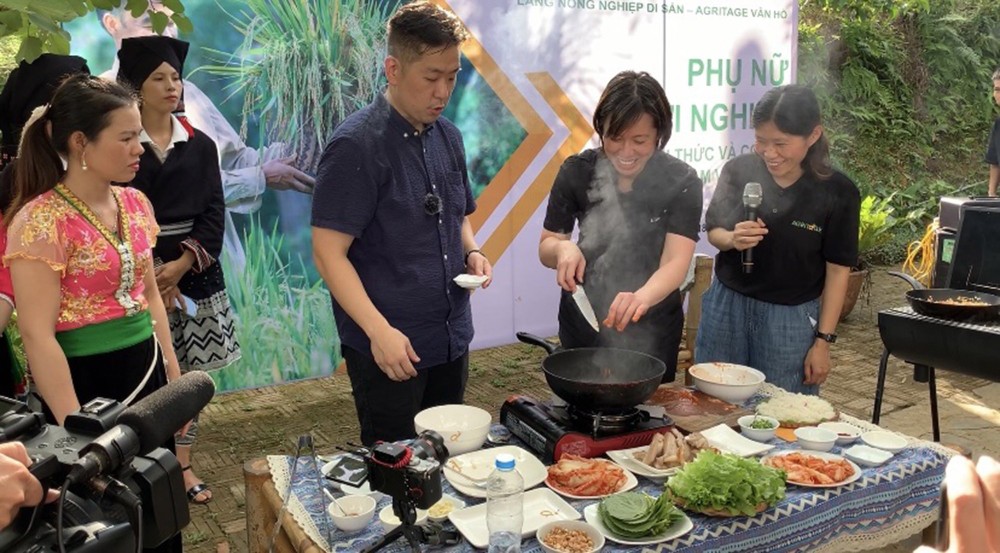 |
| Christine Ha enjoys cooking with women at Van Ho Heritage Agricultural Village – Van Ho Agritage in Buot Village in Hoa Binh Province (Photo: SGGP) |
In 2012, at the age of 32, Christine Ha was crowned the winner of Master Chef US Season 3. Outshining approximately 100 other contestants, she became the first Vietnamese-American and the first vision-impaired contestant to win this prestigious title. Despite having never received professional culinary training, Christine impressed the judges with her innate talent and her deep passion for Vietnamese cuisine. Her dishes carried the flavors of Vietnam, setting her apart from other contestants. Most importantly, for Christine, this was a part of her heart.
During her trip back to Vietnam in September, as part of the program organized by the U.S. Embassy in Vietnam, Christine shared that the elements of Vietnamese culture and heritage have greatly influenced her cooking style and life.
Although born and raised in the US, Christine Ha often enjoyed Vietnamese dishes prepared by her grandmother and mother. She has a particular fondness for dishes such as thit kho (caramelized pork), com tam suon (broken rice with grilled pork), and bun bo Hue (beef noodle soup from Hue).
After her mother passed away when she was 14, Christine didn't give much thought to learning how to cook Vietnamese food. However, one day she realized that if she didn't learn to cook these dishes herself, no one would prepare these dishes, full of memories of her mother and grandmother. From that moment, she began to teach herself to cook, relying on her imagination to recreate the flavors her mother used to prepare and her heightened senses to compensate for her lack of sight.
Christine Ha said that after learning the basics of cooking, she wanted to share her passion for cooking and the Vietnamese culinary culture. Contestants in the Master Chef prepared some of the world's finest dishes, but she just wanted to tell her story and bring the element of culture into her food.
Since her victory on the Master Chef, Christine has opened three restaurants in the United States, two of which focus on Vietnamese cuisine. Her first restaurant, "The Blind Goat," in Houston, Texas, serves Vietnamese street food with a Texan twist. Her second restaurant, "Xin Chao", is dedicated to authentic Vietnamese cuisine. She opened it with chef Tony Nguyen in September 2020 and featuring various Vietnamese dishes, tailored to American tastes. Both of her restaurants have received nominations for awards recognizing excellence in new restaurants or outstanding chefs.
Christine Ha wanted to show Americans how wonderful Vietnamese cuisine can be. However, she does this with her unique creativity. Christine uses many authentic Vietnamese ingredients in her dishes, including fish sauce, which can be hard for foreigners to embrace, and even in dishes that are not typically Vietnamese. For example, when preparing spicy Texas beef, she adds a touch of fish sauce, enhancing the flavor to be savory and delicious, without diners even realizing what secret ingredient makes it so delightful. Christine Ha revealed that when used skillfully, fish sauce becomes a "secret weapon".
During her recent visit to Hanoi, Christine Ha tried various Hanoi dishes, from bun dau mam tom (vermicelli with fried tofu and shrimp paste) to bun cha (grilled pork and noodles) and banh cuon (Vietnamese steamed rice rolls). For Christine, delicious food is about creating a balance of sweet, sour, salty, and spicy flavors, all harmonious with the dish's structure. Vietnamese cuisine embodies all these elements and has a refreshing quality due to its use of fresh ingredients.
Christine Ha agrees with the idea that Vietnamese cuisine can become a soft power to introduce Vietnam to the world. She shared that Vietnamese cuisine offers a wide range of flavors from the North to the Central and South. Therefore, when sharing food with other countries or people, in some way, it's about understanding others and creating stronger relationships.
